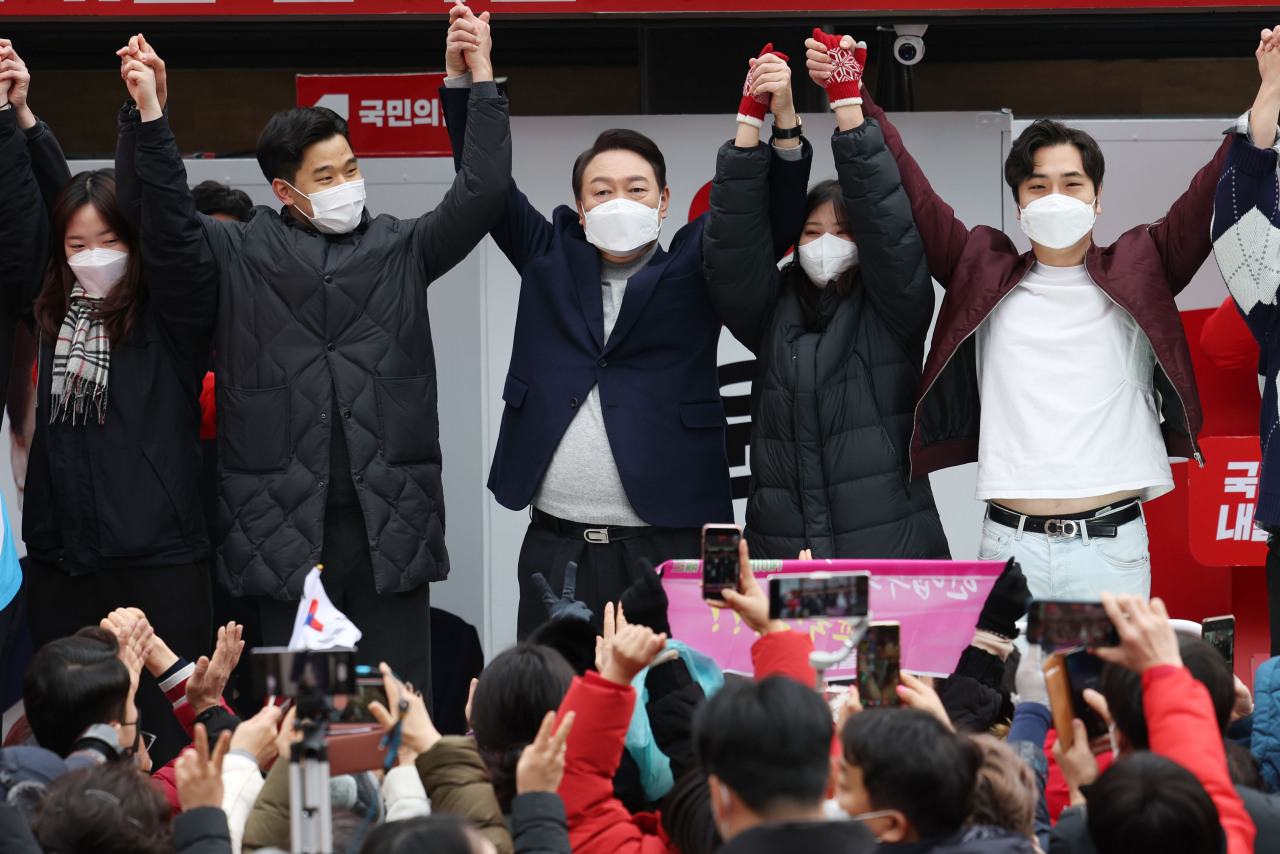The divide among age groups’ political inclinations in South Korea is breaking down, with many younger voters supporting conservatives, joining older voters.
However, though the two age groups may root for the same candidate and party, the reasons behind their support differ. While older conservatives’ support for Yoon Suk-yeol and the People Power Party has firmer footing, young conservative voters’ support is characterized by disappointment in the existing political situation.
Traditionally, those in their 20s and 30s have supported political parties with more liberal inclinations, while those in their 40s and older showed greater support for parties with more conservative views.
The upcoming election, however, is expected to open a new chapter in the history of Korean politics, as many polls show those in their 20s and 60s or older rooting for the same candidate.
Recent polls have shown the youngest and oldest groups support Yoon Suk-yeol from the main opposition People Power Party. Meanwhile, those in their 30s, 40s and 50s support Lee Jae-myung from the ruling Democratic Party of Korea.
Buzz around the term “young conservatives” in local politics has grown along with the rise of Lee Jun-seok, who is now chairman of the People Power Party. Lee, a politician in his 30s, was elected chairman of the major conservative political party here as its youngest leader ever, backed by support from the younger generation.
“It was Lee who shaped the idea of what a young conservative is. In a country where being a conservative as a young person is something that can be frowned upon, Lee allowed young conservatives to stand up and speak out,” 29-year-old office worker Kim Dong-hwan said.
Though Kim had not had a definite political inclination for most of his life, in recent years he has been identifying himself as a conservative.
“I am a conservative as I do not agree with the liberal side’s agenda related to North Korea. It is a waste of time trying to bond with the North. I think we should move on and admit that we are two separate countries,” Kim said.
Kim is not alone. Recent surveys show that more in their 20s are taking a conservative turn when it comes to voting in the upcoming election. The younger population, who have tended to be centrist or liberal, are leaning more conservative these days.
For some, voting for Yoon is not about supporting the candidate himself or the political party. It is about condemning the Moon Jae-in administration and the Democratic Party. Park, 32, a sports instructor who wished to be identified only by her surname, is among them.
“I was let down by the scandals related to figures from the current government and the Democratic Party of Korea,” Park said, referring to the college admission scandal involving ex-Justice Minister Cho Kuk’s daughter and sexual harassment allegations related to the then-mayors of Korea’s two largest cities, Seoul and Busan.
“Also, the Moon Jae-in administration really disappointed me with its housing market regulation schemes. I do not feel like the liberal side is supporting me, so why should I support them?” Park said.
For the younger generation, however, being a conservative is not a lifelong stance. Both Kim and Park said their political inclination could change depending on the circumstances.
For the older generation, however, voting conservative is not just a choice.
Lee Yeong-ho, a 64-year-old retired businessman, also identifies himself as a conservative. He says he has been a conservative all his life.
“We should always be on alert against the invasion of communism,” Lee said.
Lee believes North Korea is an “evil country” that is always looking for an opportunity to invade South Korea. However, when asked about how the South Korean government should treat the North, he said humanitarian approaches are necessary.
“We are all a family in the end. How can we neglect the sufferings of the North Korean people?” he said.
Like Park, Lee said the Moon Jae-in administration is doing a poor job with its housing market regulation schemes.
“The market is a living organism. It should be controlled only by supply and demand,” he said.
Though more and more of those in their 20s are billing themselves as conservatives, media critic Kim Nae-hun points out that the younger generation has become radicalized, rather than taking a conservative turn.
“Those in their 20s are on the front line of an anti-governmental battle with flags of unfairness and hypocrisy,” Kim wrote in his book “Radical 20s.” “But the group fails to explain what fairness is, and does not look into politics properly while blaming it.”
The younger generation is using the claim of fairness to justify their struggles, and the conservatives have the “fairness agenda” exclusively to themselves. This leaves those in their 20s to synchronize themselves to interpretations of fairness by the conservatives, Kim wrote.
By Im Eun-byel (
silverstar@heraldcorp.com)








![[Out of the Shadows] Seoul room clubs offer drugs to compete for clientele](http://res.heraldm.com/phpwas/restmb_idxmake.php?idx=644&simg=/content/image/2024/11/05/20241105050566_0.jpg)